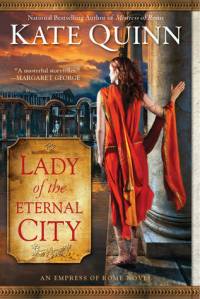Lady of the Eternal City

Kate Quinn first came to my attention last year when I read Day of Fire, the collection of cross-threaded tales by various Roman authors set against the eruption of Vesuvius in 79AD. I have to say that normally, since my trend in reading is towards the military and espionage end of the historical fiction, I probably wouldn’t have read a book with this title or cover until I had run out of books where legionaries smash someone over the head, but the thing is: Kate Quinn’s contribution to that collection of Vesuvius tales was one of the highlights of it – one of the finest pieces of writing. It showed her skill at the craft of not just writing, but storytelling. And in recent years I have learned to approach literature with an open mind. So when I was given the opportunity to read an advance copy of Lady of the Eternal City, I snapped up the chance and thanked Kate very much.
A quick word on the plot. As usual, I hate to expound too much on plots for fear of spoilers, but this plot deserves a solid treatment, really, and so I’ve delved deeper than usual, and I hope I haven’t thrown in anything I shouldn’t.
This is a novel of Hadrian. Not a biography in any way, and he is not the protagonist, but it is definitely a story about him, for he is the hub around which the world and all Kate’s characters thereupon spin. We pick up the story at the very beginning of Hadrian’s reign, with the former empress still very much alive and a certain level of trepidation across Rome as its nobles anticipate the emperor’s arrival.
None is filled with more trepidation though than Vix (Vercingetorix the Red – I thought at first I’d hate that name and it would bug me, given its Republican Gallic connotation, and yet funnily I quickly warmed to it.) Vix is a former gladiator and slave, a legionary and war hero who saved the life of Hadrian’s predecessor Trajan, and finally a Praetorian tribune. He is strong, brave and well-placed. But he and Hadrian have a history that is not all roses. And Vix has a history with the emperor’s wife, which is troublesome to say the least.
Vix and Sabina are two of the rich cast in this novel, joined by Sabina’s neice Annia and … this is where students of Roman history will see how the book is going to get interesting … Vix’s adopted stepson Antinous. The history of Antinous and Hadrian is one well documented, but this additional connection brings it home and makes the tale so much more immediate and personal. In addition to this, though, and of great interest to me personally, was an extra cast member in the form of young Marcus Aurelius – always one of my favourite characters in imperial history.
The story deals with Hadrian’s growth into his role and life within it until his eventual decline, all seen from the point of view of those few around him who are able to influence his fickle, dangerous moods. And in parallel it follows the growing relationship between Hadrian and Antinous. I won’t tell you how that one ends, but many of you who know Hadrian will already know that!
We are treated to Hadrian’s great travels round the empire as events unfold, from Rome across the Roman world, beginning with Britannia. My favourite interlude in the trip incidentally, was for the Elusinian mysteries, which have long fascinated me and it was nice to see a novelised treatment of them. Although the descriptions of Egypt drew me right back to that haunting place.
Essentially, the plot follows the relationship of Antinous and Hadrian and their relations and loves from their first distant connections to the emperor’s final days via love and tragedy in between.
What impressed me so much about this book was the handling of character. Vix is a worthy protagonist, of course, though being fictional, he can be anything Kate wants to make him. But when you’re dealing with such larger-than-life characters as Hadrian, Antinous, Antoninus Pius (still known as Titus at this point) and Marcus Aurelius, not to mention Sabina herself – the lady of the eternal city, being able to achieve a three-fold win with them is near impossible. Because the best portrayals of real characters are: believable, historically accurate, and surprising. And to do all three is the work of a true master/mistress of the author’s craft. I will focus on the principal character here because, while he is not one of the book’s protagonist, he is the one who influences them all and who they all influence…
Hadrian is not what I’d expected. I’d never seen him as capricious and dangerous before. History throws at us the picture of the ‘great’ emperor Hadrian and we laud his abilities and vision. We do not notice the idiosyncracies that go along with such genius. The Hadrian in Kate’s novel is unpredictable, violent, dangerous, clever, far-sighted, loving, adventurous and brave, and so much more. He is a truly fascinating character.
What adds to the many facets of the man, though, is his progress as an emperor. Though he is strong willed and – let’s face it – has ultimate power at his fingertips, there is a recurring theme in the book that the great man would fall foul of his own dark side and bring the empire down with him if it were not for those clever men and women surrounding him, trying to nudge him onto a path of not only greatness, but also goodness. In that respect, Vix and Sabina are the most important characters in the novel, I would say.
At the start of the novel I dreaded reading on, for I feared Hadrian was set up as a true villain, but that is not the case, and as the book progressed I came not only to understand the man, but even to appreciate him. His final scenes in the book are wonderfully portrayed and stay with me.
Throw away your mental image of Hadrian and delve into that which Kate provides. It is a fascinating study of a man and a tale that is somewhat harrowing in places – the sort of harrowing you can only experience when you become too invested in a character.
The tone and writing of the book is rich and opulent, like the world in which the characters live, and at times it might seem over-so, but I think that is just a facet of writing well about character’s motivations in the world of imperial Rome and the circles of power. And I think that the book would have been poorer for a plainer approach. Interestingly for me, Kate is an American author, and I can usually spot an American voice in the prose straight away. To some English readers, a strong American tone can be distracting, but with Kate’s prose it blended seamlessly into the history and felt as comfortable to a British reader as a British author would.
So in short, this is a very intricate character-driven piece about the complex character that was Hadrian and the effects upon him of those few folk who were strong and wily enough to help him be what he needed to be. It is also a tale of more than one love and more than one loss. It is a rich Roman tapestry that draws your attention and holds it throughout.
Highly recommended, and confirms what I suspected: Kate Quinn is at the top of her game.


Wow…another fine review and another book for the TBR…have re-blogged this 🙂
LikeLike
tigers68
March 10, 2015 at 9:07 am
Thank you, matey.
LikeLiked by 1 person
SJAT
March 10, 2015 at 4:07 pm
Reblogged this on Historical Fiction reviews and commented:
Simon not only writes good books, he writes a mean review 🙂
LikeLike
tigers68
March 10, 2015 at 9:08 am
Reblogged this on Historical Fiction reviews.
LikeLike
tigers68
March 10, 2015 at 9:15 am
Thank you for such a splendid review – I am absolutely delighted you enjoyed Lady of the Eternal City!
LikeLike
Kate Quinn
March 10, 2015 at 3:50 pm
My pleasure, Kate. Your Hadrian fascinated me. You can probably tell. And when he was talking about returning to Baia at the end… I was rather moved!
LikeLike
SJAT
March 10, 2015 at 4:08 pm
Yes, it’s interesting that he spent his whole life building his massive villa, and he holed up there as his health waned – yet he didn’t die there. He went off to Baiae instead and died by the sea, and I wondered why. Maybe the dream villa felt like a tomb at the end – who knows?
Glad you found Hadrian so interesting; I certainly did too. I’ve never researched a historical figure so endlessly contradictory.
LikeLike
Kate Quinn
March 10, 2015 at 4:13 pm
[…] and reviewed ‘Lady of the Eternal City’, her latest, and you can check out my review here. I was perusing potential things to add to my kindle when I came across The Three Fates (and the […]
LikeLike
Rome and Egypt | S.J.A.Turney's Books & More
October 15, 2015 at 9:25 am
[…] Again, a contributor to A Day Of Fire, Kate Quinn proved herself to me with this novel, which is languorous and exotic and yet at the same time informative and pacy, showing a side of the emperor Hadrian that I had never even imagined. A win on several levels. Read my review here. […]
LikeLike
Top 10 reads of 2015 | S.J.A.Turney's Books & More
December 31, 2015 at 12:53 pm